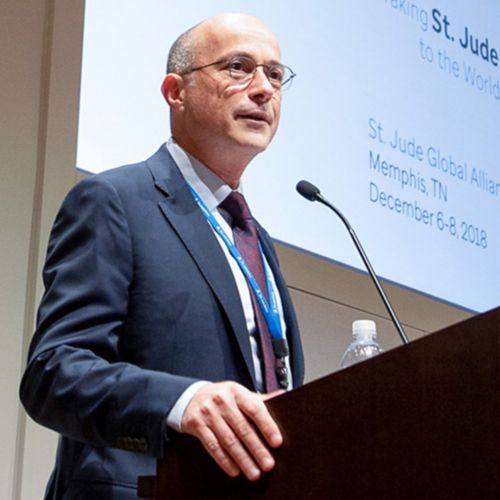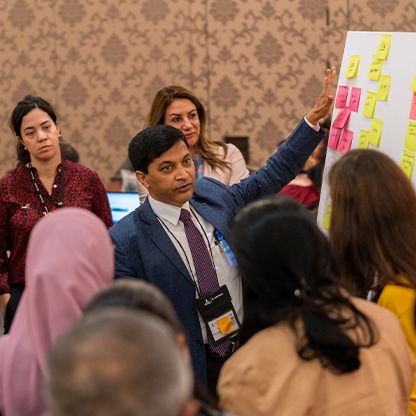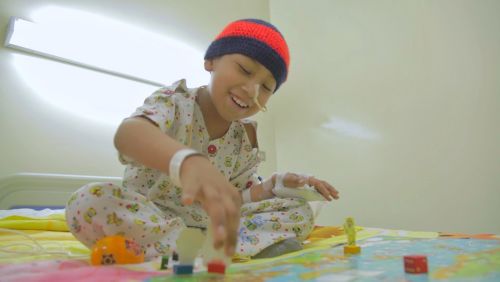St. Jude Family of Websites
Explore our cutting edge research, world-class patient care, career opportunities and more.
St. Jude Children's Research Hospital Home

- Fundraising
St. Jude Family of Websites
Explore our cutting edge research, world-class patient care, career opportunities and more.
St. Jude Children's Research Hospital Home

- Fundraising
Global Scholars: Dr. Jocelyn Rivera
Other Global Scholars Projects:
Dr. Rivera works to transform care of critical patients
When Dr. Jocelyn Rivera first arrived at the Hospital Infantil Teletón de Oncología in her native Mexico, she set out to convey the power of an hour.
She was hired to lead the emergency department, and she knew how critical it was that children with cancer receive antibiotics within 60 minutes of arriving in the emergency room with complications.
“It’s called the golden hour,” she says. “If you can administer the antibiotic in less than an hour, you completely change the prognosis for these patients. Infection being the first cause of mortality in the pediatric oncology population, this is really important.”
Rivera made it her mission to communicate this to the hospital’s emergency room personnel. “I knew,” she adds, “that I had to achieve this goal and that I would have to work really hard to achieve this kind of goal.”
She started with a stopwatch. But she made it fun, using a kitchen timer shaped like a cat and making it a competition. As soon as a patient would arrive in the emergency room, she’d start the clock.
“I was so strict about this that everybody knew that they needed to begin the antibiotic before the alarm sounded,” she says. “The nurses started working with me really hard. And they were even competing. We achieved the goal.”
This experience exemplifies several core tenets of Rivera’s career in pediatric oncology: Using teamwork to achieve goals, enhancing communication among clinical teams and introducing effective programs to more facilities.
Rivera has worked with St. Jude leaders and others to bring the Golden Hour program to an additional 25 hospitals across Mexico. “The results were amazing,” she says. “Everybody was so excited. It was really beautiful to see.”

“When I [learned] about the master’s program at St. Jude, I thought, this is the right fit for me. I want to keep working on programs to change clinical care for children in low- and middle-income countries around the world.." -- Dr. Jocelyn Rivera
Rivera also led the implementation of the Pediatric Early Warning System (PEWS) initiative at her facility before collaborating with St. Jude to help bring this lifesaving tool to 60 more institutions.
PEWS, or Escala de Valoración de Alerta Temprana (EVAT) in Spanish, gives bedside nurses an effective tool to identify a patient’s changing clinical condition in real time. It empowers nurses to communicate the patient’s condition in an objective way to the multidisciplinary team. This process helps identify clinical deterioration earlier, allowing more timely intervention to prevent complications and critical illness.
“EVAT is changing the prognosis for patients in so many countries, that I knew that I wanted to keep working on these kinds of projects,” Rivera says. “When I [learned] about the master’s program at St. Jude, I thought, this is the right fit for me. I want to keep working on programs to change clinical care for children in low- and middle-income countries around the world.”
Rivera is a member of the first cohort of Global Scholars, who earned a Master of Science in Global Child Health from the St. Jude Children’s Research Hospital Graduate School of Biomedical Science in 2021. She and the nine other graduates in her cohort now working on their Global Scholars Projects.
As part of her Global Scholars Project, Rivera is evaluating the impact of PEWS and developing training resources to improve communication on similar projects that enhance the quality of care. Introducing these projects to new facilities, she’s already seen the importance of adapting to specific hospitals.
Rivera’s enthusiasm is evident, but there was a time when she wasn’t sure pediatric oncology was the right field for her. She had wanted to be a doctor since she was young. And she loved working with children. Their innocence stands out when they face a challenge like cancer, she says.
But it was sometimes difficult early in her career to see young oncology patients in great pain and watch them battle multiple challenges. It was tough to see the effects on the families.
Now, though, she has found a home in emergency pediatrics and in the bright-colored atmosphere at the Hospital Infantil Teletón de Oncología. The hospital is the first in Mexico completely dedicated to pediatric oncology.
“One of the most wonderful things that happened in my life is working in the pediatric oncology field,” she says. “The pain that I already knew that families had is still there. But we work so hard to make this easier for them. I have fallen in love with this field. I really love working with these patients.”
Now her time in the Global Scholars Program is preparing her for the next chapters of that work — both in Mexico and beyond.
“I cannot believe my luck to be in the Global Scholars Program,” she says. “I didn’t plan to work in pediatric oncology. It was something that happened in my life suddenly, and right now, it is the most important thing for me.
“To keep working on my abilities with this program certainly will make all the difference for the future. I think that I will keep working on things that I learn from this program [for] the rest of my career,” Rivera says.


